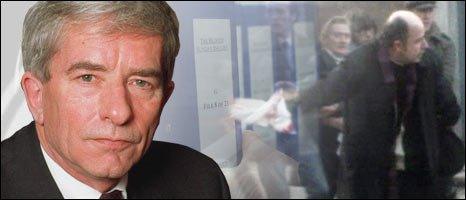The Saville Inquiry: Q&A
- Published

What was the Saville Inquiry?
The Saville Inquiry was the independent public inquiry set up to examine the events of 30 January 1972 in Londonderry, Northern Ireland.
Thirteen people died after members of the British Army's Parachute Regiment opened fire on civil rights marchers in the Bogside area.
The day became known as Bloody Sunday.
Why was it set up?
An initial investigation headed by Lord Widgery shortly after the shootings was regarded by Irish nationalists as a whitewash.
Relatives of the victims campaigned for years for a fresh investigation to challenge Widgery's conclusions that the soldiers were fired on first and the victims had been handling weapons.
The prospect of a new inquiry formed part of the peace process negotiations leading up to the Good Friday Agreement, and was viewed by many unionists as a concession to Sinn Fein.
The new inquiry opened in April 1998.
Who led the inquiry?
The British Law Lord, Lord Saville of Newdigate, led the three judge panel which sat in Derry's Guildhall and in London.
Public hearings began in March 2000, and the final witness was heard in January 2005.
2,500 statements were taken, of whom 922 people were called to give direct evidence.
The inquiry also considered 160 volumes of evidence, 121 audio tapes and 110 video tapes.
The report, which was originally scheduled for publication in 2005, has been repeatedly postponed.
It was to be given to the Secretary of State in March 2010, but was delayed until after the general election.
It has cost around £195m.
Why was it deemed necessary?
The then Prime Minister, Tony Blair, announced a fresh inquiry because of "the weight of new material available".
The announcement followed a sustained campaign by the relatives of the victims, who in 1997 presented the Irish government with a 178-page dossier of evidence about Bloody Sunday.
It included many previously unconsidered witness statements, an assessment of fresh information about the shootings, and a damning indictment of the original inquiry headed by Lord Widgery.
Tony Blair said the aim of the inquiry was "not to accuse individuals or institutions, or to invite fresh recriminations, but to establish the truth about what happened on that day, so far as that can be achieved at 26 years' distance."
Why did it take so long?
The Saville Inquiry was the longest inquiry in British legal history.
In 1998 it was estimated that the inquiry would last only a year.
610 soldiers, 729 civilians, 30 journalists and photographers, 20 government officials and 53 police officers gave evidence in some form.
The unprecedented scale of the evidence meant that much of the first two years were taken up with amassing evidence.
Considerable time was also spent collating witness statements, and tracking down soldiers who were on duty in the city on Bloody Sunday.
A legal battle over the anonymity of the soldiers giving evidence also caused a series of delays.
Rulings by the inquiry were challenged in the courts several times, and eventually almost all soldiers were allowed to remain anonymous.
A group of 36 soldiers, believed to include those who fired the fatal shots, were also allowed to give their evidence without returning to Derry.
The inquiry moved to London in September 2002 to hear their evidence.
The final witness was heard in January 2005, and the report was scheduled for publication that summer.
However in 2005 inquiry said the "very large quantity of material" meant it was "not possible... to give any firm estimate of when the report is likely to be finished".
It was since been postponed many times.
Why did it cost so much?
Saville is also the costliest inquiry ever carried out by the British government.
The price tag stood is just short of £200m.
Much of the money was spent on legal fees.
The unprecedented scope of the inquiry, and the need to relocate to London to hear evidence from soldiers and security force witnesses, was also costly.
Why is it significant?
It is now widely accepted that the victims of Bloody Sunday were unarmed civilians.
For the relatives of the victims, the significance of the Saville Inquiry is to make this truth public.
"I want it to declare that my brother and everybody else who was murdered and maimed that day was totally innocent of the terrible allegations which the state and its soldiers laid against our people," said Mickey McKinney, whose brother Willie was killed on Bloody Sunday.
Will it lead to prosecutions?
It is possible that individual soldiers could be prosecuted for their role in Bloody Sunday, but in practice this is highly unlikely.
Some relatives of those killed want the soldiers who shot their loved ones to face trial.
"I hope there are recommendations within the report that those responsible will be brought to justice and sentenced," said Mickey McKinney.
"I know it's a tall order, but I haven't heard a good explanation yet as to why that shouldn't happen," he said.
For others, their only concern is that the truth be told.